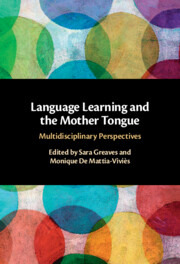Book contents
- Language Learning and the Mother Tongue
- Language Learning and the Mother Tongue
- Copyright page
- Epigraph
- Contents
- List of Contributors and Their Works
- Acknowledgements
- Introduction
- Part I The Mother Tongue and Second Language Learning
- 1 Entering into Language and into Languages
- 2 One Mother Tongue – or Two?
- 3 Embracing the Bilingual Overlap in Creative Second Language Learning
- Part II From the Mother Tongue to the Second Mother Tongue
- Part III The Second Mother Tongue as a (M)other Tongue and the Return to the Body
- Subject Index
- Author Index
- References
1 - Entering into Language and into Languages
From the Mother Tongue to the (M)other Tongue
from Part I - The Mother Tongue and Second Language Learning
Published online by Cambridge University Press: 16 June 2022
- Language Learning and the Mother Tongue
- Language Learning and the Mother Tongue
- Copyright page
- Epigraph
- Contents
- List of Contributors and Their Works
- Acknowledgements
- Introduction
- Part I The Mother Tongue and Second Language Learning
- 1 Entering into Language and into Languages
- 2 One Mother Tongue – or Two?
- 3 Embracing the Bilingual Overlap in Creative Second Language Learning
- Part II From the Mother Tongue to the Second Mother Tongue
- Part III The Second Mother Tongue as a (M)other Tongue and the Return to the Body
- Subject Index
- Author Index
- References
Summary
This chapter draws on the conceptual framework of attachment theory and the bodily imprint on the psyche, as elaborated by John Bowlby, among other psychoanalytical references, and on examples taken from French- or English-language writers such as Louis Wolfson. It focuses on the language learning process in early childhood and its repercussions later in life in second language learning. It is rooted in the author’s experience as professor of English at Aix-Marseille University and her lifelong interest in psychoanalysis, supplemented by a research experiment in a children’s clinic during which she attended psychiatric consultations with small children suffering from speech impediments, and their parents. In this chapter, she provides an account of the hybrid nature of the Mother tongue, analyses the social and linguistic tensions experienced by children caught between the ‘interior’ languages (the Mother tongue is already divided) of their family circle and the ‘exterior’ language spoken at school ‘beyond the bounds of the mother’. When these experiences produce trauma, their reactivation in adulthood by the attempt to speak a foreign language can prove an inhibiting force.
Keywords
- Type
- Chapter
- Information
- Language Learning and the Mother TongueMultidisciplinary Perspectives, pp. 15 - 38Publisher: Cambridge University PressPrint publication year: 2022
References
Bibliography
Online Lectures and Radio Programmes
- 2
- Cited by

